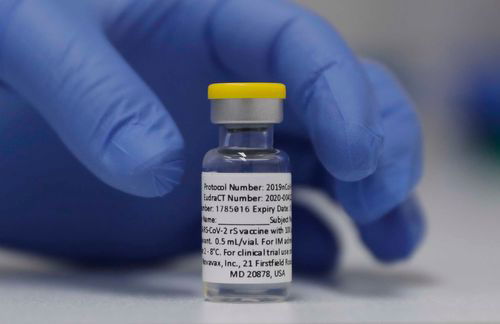Novavax says Covid-19 vaccine is 89% effective in UK trial, but less so in South Africa

A new Covid-19 vaccine from Novavax was found to be 89.3% effective in a clinical trial conducted in the UK and appears to offer protection against some variants of the coronavirus, the American biotech firm has announced.
The vaccine is the first to show it is effective against new variants during trials, with high levels of protection seen in the variant that first emerged in the UK and some protection against one first reported in South Africa.
Novavax said Thursday that its vaccine — which is administered in two doses — was 95.6% effective against the original coronavirus strain, and 85.6% effective against the variant first identified in the UK, known as B.1.1.7, based on results from its Phase 3 trial conducted in the UK. This gave an average efficacy of 89.3%.
The trial involved more than 15,000 participants between the ages of 18-84, of whom 27% were aged 65 years or older — the group at most risk from the virus. Among them, 56 cases of Covid-19 were found in the placebo group and 6 cases in people who received the vaccine.
Half of the Covid-19 cases identified in the trial were found to be caused by the variant first seen in the UK.
Professor Paul Heath, chief investigator of the UK Novavax trial, said the results were very important, particularly in regards to the efficacy against the UK variant. He also said the findings held positive implications for vaccine development as new variants transpire, adding there was “a lot of light now at the end of the tunnel.”
“It tells us that though new variants are occurring, and of course they will continue to occur, this is the nature of the virus, it does not necessarily mean that they will have a significant impact on our vaccines,” Heath said during a press briefing for the UK’s Science Media Centre.
However, the vaccine appeared to be less effective in a separate Phase 2b study conducted in South Africa, where it showed 60% efficacy. More than 4,400 participants were involved in the trial, among which 15 Covid-19 cases were identified in people given the vaccine and 29 in the placebo group — and 92% of cases were caused by the variant first seen in South Africa.
Importantly, around one third of the participants already had antibodies against the virus, implying they had already been infected by the original coronavirus and this had not protected them against the new variant, according to the company.
Novavax said it was planning to start development of a vaccine specifically targeting the variant identified in South Africa. The company also said it had already started work on a new version of the vaccine that could be used as a booster shot against emerging strains. It aims to start clinical testing of this in the second quarter of this year.
“The vaccines can be adapted relatively quickly and that’s really important because it means we can then stay ahead of the virus and continue to have vaccines that will be effective and drive these rates down,” said Heath.
The company’s vaccine, known as NVX-CoV2373, “is the first vaccine to demonstrate not only high clinical efficacy against COVID-19 but also significant clinical efficacy against both the rapidly emerging UK and South Africa variants,” Stanley Erck, Novavax president and CEO, said in the announcement. “NVX-CoV2373 has the potential to play an important role in solving this global public health crisis.”
Regarding the trial in South Africa, “the 60% reduced risk against COVID-19 illness in vaccinated individuals in South Africans underscores the value of this vaccine to prevent illness from the highly worrisome variant currently circulating in South Africa, and which is spreading globally,” Shabir Maddi, principal investigator in the Novavax Covid-19 vaccine trial in South Africa, said in the announcement.
The Novavax vaccine differs in design from both the Pfizer/BioNTech and Oxford/AstraZeneca versions. It is made up of biosynthetic proteins engineered from the DNA of SARS-CoV-2 — the virus that causes Covid-19 — that aim to induce an immune response to the spike protein found on the coronavirus. The spike protein is a structure on the outside of the virus that it uses to get into cells.
Heath described it as a “simple vaccine platform” that has spike proteins combined with an adjuvant — a substance to improve the immune response. It is stable at 2 to 8 degrees Celsius, meaning that unlike the ultra-cold Pfizer/BioNTech vaccine, it’s more easily transportable to patients for use.
“This gives sound confirmation that the “spike” protein is an excellent target for vaccination,” Dr. Al Edwards, associate professor in biomedical technology at the University of Reading, told the UK’s Science Media Centre. “It expands the potential global capacity for COVID-19 manufacturing, because this type of vaccine can be made in different factories to RNA or viral vaccines,” he added.
UK Prime Minister Boris Johnson welcomed the results of the British trial, hailing the “good news” that the vaccine candidate had proved effective and expressed his gratitude to “all the volunteers who made these results possible” in a tweet.
“Our medicines regulator will now assess the vaccine, which will be made in Teesside. If approved, we have 60m doses on order,” he added.
The UK’s inoculation program has seen over 7.4 million people receive the first dose of a coronavirus vaccine so far, the latest government figures show. Two vaccines, from Pfizer/BioNTech and Oxford/AstraZeneca, are already in use in the phased nationwide rollout. The Moderna jab has received the green light too.
Novavax is also currently conducting a Phase 3 clinical study in the United States and Mexico and a Phase 1/2 continuation in the US and Australia, data from which are expected as soon as early first quarter 2021.